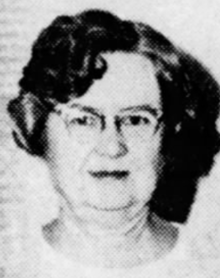Mary Wilma Hodge (October 20, 1909 – February 10, 1999) was an American physicist and college professor, best known for her work on instruments to measure conditions in the Earth's atmosphere, during her long career with the National Oceanographic and Atmospheric Administration.
Early life and education
Hodge was born in Calhoun County, Mississippi, the daughter of John Samuel Wymac Hodge and Beulah Spradling Hodge. She earned a bachelor's degree in 1930, and a master's degree in 1931, both at the University of Mississippi. She completed doctoral studies in physics at the University of North Carolina in 1938, with a dissertation titled "Statistical Behavior of Geiger-Müller Tube Counters."
Career
Hodge taught physics, meteorology, and astronomy courses at the University of Mississippi from 1931 to 1942. She also taught at the University of North Carolina. She was co-author of Laboratory Experiments In Physics (1934, 1936), a two-volume college textbook, with S. C. Gladden and W. L. Kennon.
Hodge left academia to be a physicist with the United States Weather Bureau from 1942 to 1966, and with the National Oceanographic and Atmospheric Administration from 1966 to 1977. In 1963, she became chief of the Atmosphere Section of the Physical Science Laboratory at the National Weather Service. She worked on measurement instruments, and developed balloon-borne sensors for studying the ozone layer. "She's an expert on the response of the instrument's sensors under various conditions and the corrections needed to make the readings accurate," explained a colleague in 1972.
She was a member of the American Physical Society and the American Meteorological Society. Her research was published in academic journals including American Journal of Physics, Review of Scientific Instruments, Journal of Geophysical Research, and Monthly Weather Review. In 1972, she received a Bronze Metal from Department of Commerce and a Length of Service Award from the National Weather Service.
Selected publications
- "The Physicist and the Weather" (1939)
- "An Interval Meter and Its Application to Studies of Geiger Counter Statistics" (1940, with Raymond L. Driscoll and Arthur Ruark)
- "The Physics Building Project at the University of Mississippi" (1940, with W. L. Kennon, A. B. Lewis, and S. C. Gladden)
- "Superadiabatic Lapse Rates of Temperature in Radiosonde Observations" (1956)
- "On the relations between variations of the Earth's magnetic field and variations of the large-scale atmospheric circulation" (1950, with Oliver R. Wulf)
- "Compatibility of United States Radiosondes" (1965, with Christos Harmantas)
- "Large Irregularities in the Rawinsonde Ascensional Rates within 100 Nautical Miles and Three Hours of Reported Clear Air Turbulence" (1967)
- "Analysis of Clear Air Turbulence from Rawinsonde Ascensional Rates" (1969, with Harold B. Cole and DeVer Colson)
Personal life
Hodge was active at the Hughes United Methodist Church in Kensington, Maryland. She died in 1999, aged 89 years, at a nursing home in Adelphi, Maryland.
References
- "J. A. Hodge Loses Brother Tuesday". Clarion-Ledger. 1947-07-16. p. 2. Retrieved 2021-10-26 – via Newspapers.com.
- ^ Lives of Mississippi Authors, 1817-1967. Univ. Press of Mississippi. 1981. p. 232. ISBN 978-1-61703-418-3.
- "11 Will Receive Master Degrees". Clarion-Ledger. 1936-05-30. p. 3. Retrieved 2021-10-26 – via Newspapers.com.
- University of North Carolina at Chapel Hill (1938-06-07). Commencement. University of North Carolina at Chapel Hill University Library. p. 10 – via Internet Archive.
- "Pilot Training Faculty Announced". Biloxi Daily Herald. p. 8. Retrieved October 26, 2021 – via NewspaperArchive.com.
- "Faculty Changes Are Announced (continued)". Sun Herald. 1941-03-18. p. 7. Retrieved 2021-10-26 – via Newspapers.com.
- "Jacksonian Added to Staff". Clarion-Ledger. 1936-09-12. p. 2. Retrieved 2021-10-26 – via Newspapers.com.
- ^ "Receives Award on Retirement". Clarion-Ledger. 1972-07-18. p. 6. Retrieved 2021-10-26 – via Newspapers.com.
- "Program for Vapor Measurement Stems from Conference". Scientific Ballooning. 8: 5. March 1963.
- ^ "Obituaries: Mary Wilma Hodge, Weather Service Physicist". The Washington Post. February 18, 1999. Retrieved October 26, 2021.
- ^ Kennon, W. L.; Lewis, A. B.; Gladden, S. C.; Hodge, Mary W. (1940-10-01). "The Physics Building Project at the University of Mississippi". American Journal of Physics. 8 (5): 294–299. Bibcode:1940AmJPh...8..294K. doi:10.1119/1.1991590. ISSN 0002-9505.
- ^ Driscoll, Raymond L.; Hodge, Mary W.; Ruark, Arthur (1940-08-01). "An Interval Meter and Its Application to Studies of Geiger Counter Statistics". Review of Scientific Instruments. 11 (8): 241–250. Bibcode:1940RScI...11..241D. doi:10.1063/1.1751699. ISSN 0034-6748.
- ^ Wulf, Oliver R.; Hodge, Mary W. (1950). "On the relations between variations of the Earth's magnetic field and variations of the large-scale atmospheric circulation". Journal of Geophysical Research. 55 (1): 1–20. Bibcode:1950JGR....55....1W. doi:10.1029/JZ055i001p00001. ISSN 2156-2202.
- ^ Hodge, Mary W.; Harmantas, Christos (1965-04-01). "Compatibility of United States Radiosondes". Monthly Weather Review. 93 (4): 253–266. Bibcode:1965MWRv...93..253H. doi:10.1175/1520-0493(1965)093<0253:COUSR>2.3.CO;2. ISSN 1520-0493.
- "Dr. Mary D Hodge Receives Medal, Begins One-Year Trial Retirement" NOAA Week (July 14, 1972): 4.
- Hodge, Mary W. (1939). "The Physicist and the Weather". Journal of the Mississippi Academy of Sciences.
- Hodge, Mary W. (1956-03-01). "Superadiabatic Lapse Rates of Temperature in Radiosonde Observations". Monthly Weather Review. 84 (3): 103–106. Bibcode:1956MWRv...84..103H. doi:10.1175/1520-0493(1956)084<0103:SLROTI>2.0.CO;2. ISSN 1520-0493.
- Hodge, Mary W. (1967-03-01). "Large Irregularities of Rawinsonde Ascensional Rates within 100 Nautical Miles and Three Hours of Reported Clear Air Turbulence". Monthly Weather Review. 95 (3): 99–106. Bibcode:1967MWRv...95...99H. doi:10.1175/1520-0493(1967)095<0099:LIORAR>2.3.CO;2. ISSN 1520-0493.
- Hodge, Mary W.; Cole, Harold B.; Colson, DeVer (1969-09-01). "Analysis of Clear Air Turbulence from Rawinsonde Ascensional Rates". Defense Technical Information Center. Archived from the original on October 26, 2021.
